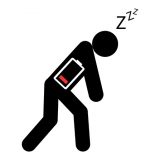What you Need to Know About Sleep & Children’s Mental Health
Is your teen getting enough sleep?
For many teenagers, late nights and groggy mornings feel like part of growing up, but research shows the stakes are much higher than a little crankiness. In this article, we’ll take a look at the connection on sleep and teens – and how vital it is for their mental health.

Quality sleep is essential for healthy brain development, emotional balance, and overall well-being. Without enough rest, teens aren’t just tired; they may struggle with impulse control, mood regulation, academic performance, and even long-term mental health.
A recent study from the University of Georgia found that sleep deprivation in teenagers causes more than just moodiness. It alters brain connectivity, making it more difficult for them to regulate their emotions, control their impulses, and thrive in school and in social situations.
Fitbit Sleep Data
Utilizing data from the Adolescent Brain and Cognitive Development Study, researchers monitored over 2,800 teenagers using Fitbits and MRIs to examine the effects of sleep on the brain. Some of its findings included:
- Teens who slept less and had poor sleep quality had fewer connections between the parts of their brains that deal with self-reflection, emotional regulation, and decision-making.
- Problem behaviors like hostility, poor impulse control, and acting out have been connected to these disruptions.
 “Many parents want their teens to grow up and be successful, so it’s important to know how the lack of sleep can inhibit their ability to succeed,” says Katelyn Klein Child Psychotherapist at Prasad Counseling and Training. “More quantity and quality of sleep can help their teen’s mental health both short term and long term.”
“Many parents want their teens to grow up and be successful, so it’s important to know how the lack of sleep can inhibit their ability to succeed,” says Katelyn Klein Child Psychotherapist at Prasad Counseling and Training. “More quantity and quality of sleep can help their teen’s mental health both short term and long term.”
Lead author of the study, Linhao Zhang says, “Adolescence is an extremely critical period for brain development. And sleep is critical for brain development. But many adolescents don’t get enough quality sleep at night.”

Bigger Sleep Issues for Boys & Minorities
The study found that minority youth, older adolescents, and boys tended to sleep less, which was associated with greater rates of behavioral issues on follow-up tests. Even minor sleep deprivations can develop into major problems that affect mental health and emotional growth over time.
What can parents do? Katelyn recommends:
- Establish clear bedtime routines
- Reduce electronic use before bed
- Develop rituals to help the brain wind down
“These are simple but powerful steps”, she says.
Teens and their parents should have open conversations about their sleep patterns, including whether they are experiencing problems falling or staying asleep. Finding hidden challenges might be greatly improved by having a conversation.
Sleep is a mental health tool, not just a lifestyle choice. One of the best things you can do for their future is to help them sleep better in the present.
Underlying Factors Keeping Your Teen Up at Night?
Sleep is more than just rest. It’s a vital part of a teenager’s mental health and overall development. While healthy sleep habits are important, sometimes underlying issues such as anxiety, depression, stress, or family challenges can interfere with a child or teen’s ability to get the rest they need.
At Prasad Counseling and Training, we understand the deep connection between mental health and sleep. Our licensed therapists provide compassionate, evidence-based support for individuals of all ages – including children and teenagers – helping them work through challenges that may be keeping them up at night.
If your child or teen is struggling with sleep or showing signs of emotional distress, know that support is available. With the right tools and guidance, better sleep and better mental health are possible. Contact Prasad Counseling and Training to learn more about our individual and family therapy options. Let us know how we can help you and your teen!


